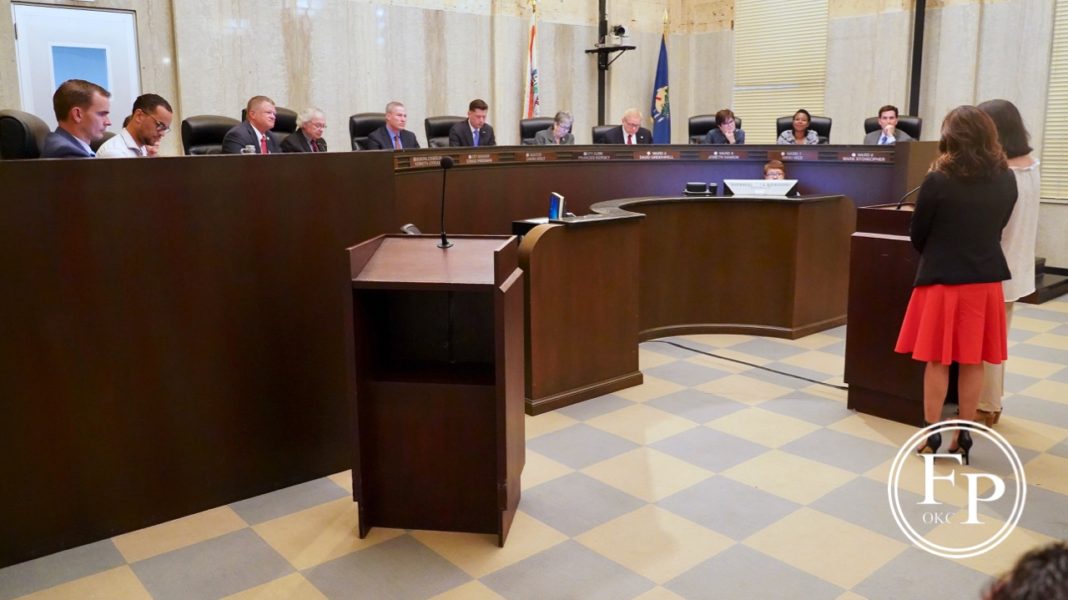Last Updated on September 29, 2020, 5:59 PM | Published: September 29, 2020
In Tuesday’s regular meeting of the City Council of Oklahoma City, a controversial panhandling ordinance was revisited. The Council also adopted several amendments to the city’s CARES Act allocations.
Panhandling Revisited
The Council considered appealing a ruling by the 10th Circuit Court of Appeals that recently found Oklahoma City’s controversial public safety/panhandling ordinance unconstitutional. Passed in 2015, the ordinance was first introduced as an effort to curb panhandling around the city. When challenged, the ordinance took on a new form styled as a public safety ordinance.
It was challenged in a public hearing at the time by many members of the faith community and social service providers but ultimately passed. The original ordinance passed in December 2015, made it illegal for anyone to sit or stand in a median less than 35 feet wide. The ordinance was amended later to allow occupying a median on a street where the speed limit was 35 miles per hour or slower.
A lawsuit was filed by a group of persons who claimed their first amendment rights were infringed upon by the ordinance.
On August 31, the Tenth Circuit Court of Appeals decided that the ordinance was unconstitutional on 1st Amendment grounds. It then returned to City Council to consider an appeal of that decision.
Public Comment
During Tuesday’s meeting the Council heard public comment. The ordinance and its appeal were universally decried by commenters.
Dan Straughan, Executive Director of the Homeless Alliance, chose to forego moral arguments, focusing instead on the financial mismanagement he indicated appealing would be. He implored the Council not to fall prey to the “sunk cost fallacy,” saying that the money spent on defending the ordinance is already gone, not to be recovered.
“Please don’t tilt at this Quixotic windmill,” he said.
Straughan was one of seven callers who pleaded with the Council to finally let this ordinance die.
Other callers included Ranya Forgotson, Director of the Curbside Chronicle, an employment program whose participants sell magazines, frequently to vehicular traffic.
Several local activists and advocates also called to represent organizations and faith-based groups. All callers said they were against the ordinance.
Instead of discussion from the horseshoe, Ward 8 Councilman Mark Stonecipher quickly moved to continue the item during the Executive Session.
Upon returning from a lengthy Executive Session, the council voted 6-3 to defer the item to the next Council meeting. Wards 2, 6, and 7 Councilors James Cooper, JoBeth Hamon, and Nikki Nice each voted against the deferral.
CARES Act
In the latest round of CARES Act deliberation, the Council voted to amend allocations to provide some flexibility in operations under agreements with partners.
With the amendment of the city’s CARES Relief Fund Plan, some money will be moved from one “pot” to others to be more effective.
The first change is to increase the amount in the city’s agreement with the Oklahoma Medical Research Foundation in the amount of $537,400.
Plans to continue the Small Business Continuity Program resulted in an increase in the agreement with First Fidelity Bank in the amount of $23,523,000. This will allow the program to fund applications that have been approved but are not yet funded, as well as expand certain features of the program.
A third amendment to the agreement with the Alliance for Economic Development is an increase of $3,175,000 to enhance their Small Business Technical Assistance program and Business Retrofits Program Services.
The agreement between the city and the Communities Foundation of Oklahoma to administer Resident Support Services was amended to add $251,670 to enhance programming. The program has received over 10,000 applications from Oklahoma City residents in need of rental, mortgage, utility, and food assistance. This money will allow the program to add a full time case worker and offer more assistance.
A final CARES item was to move $1,000,000 for an agreement with the United Way of Central Oklahoma to administer assistance for costs and lost revenue among the United Way’s partner agencies in Oklahoma City.
Minority Support
During the discussion of CARES funding, the Council heard from callers on the city’s Northeast side. Each caller implored the Council to find ways to specifically assist in maintaining what some referred to as the Northeast Renaissance. Speakers explained that the Northeast part of town has been particularly hard hit by the economic downturn of the coronavirus.
“When Downtown OKC sneezes, the eastside of OKC gets pneumonia,” one caller said.
Other Business
In other business at Tuesday’s meeting, the Council heard updates from Roy Williams of the Chamber of Commerce, as well as a presentation about the city’s economic outlook. Both presentations urged caution, but explained that the city has weathered the financial storm of the pandemic better than expected so far.
Public Works Director Eric Wenger gave a presentation on the closure of sidewalks for construction projects. Councilmembers Cooper and Hamon have been in conversation with Wenger about pedestrian access during construction. Wenger explained that the process for closing a right-of-way currently is to simply get a $25 permit.
Wenger explained that his department has reached out to other cities to find how they handle sidewalk closures and permitting. He said that the next step is to implement some of those best practices and to hold construction project contractors accountable for compliance.
When a sidewalk is improperly blocked, residents are encouraged to contact the Action Center.
The next meeting of the City Council will be at 8:30 a.m. on October 13.
Columnist covering local government in Oklahoma City and Oklahoma County from May 2019 through June 2023.










